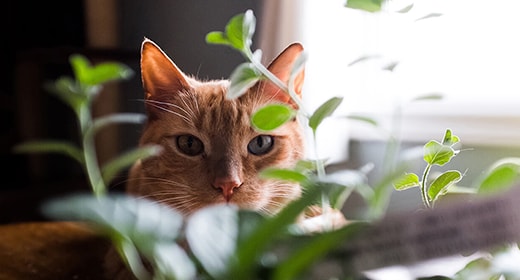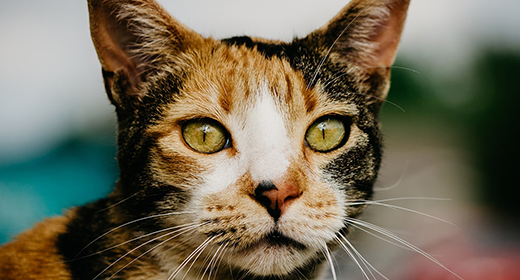

Humans aren’t the only ones affected by allergies. Like you, your adult cat can suffer from allergic reactions to any number of things in the air, on her skin and in her food. Allergies must be diagnosed and treated by a veterinarian, but first you must know what to look for.
Four of the most common types of allergies that might affect your cat are inhalant, food, contact and flea allergies.
Inhalant allergies in cats are caused by the same common allergens that affect you: dust, grass, trees, mold, pollen, ragweed and so on. They can be seasonal or persistent, and while some breeds may experience the same sniffly, sneezy symptoms humans often suffer, skin reactions are most common. Inhalant allergies can often be treated with the same medications you take, but please don’t treat your cat’s allergies without veterinary supervision.
Food allergies in cats can be the most difficult to diagnose and manage. Treatment involves a hit-or-miss approach involving a restricted diet and the gradual reintroduction of possible allergens to determine the culprit. Skin reactions to food allergies are common in cats, but frequent vomiting or diarrhea also can be a sign. Keep in mind that if your cat’s diet changes (or she just ate something she wasn’t supposed to), she may experience an episode of vomiting or diarrhea. This doesn’t necessarily mean your cat has an allergy. Watch and see if it becomes a persistent problem before scheduling a trip to the vet.
You might be surprised to learn that most cats are only vaguely bothered by fleas. But those that are allergic can suffer — and so can their owners. Contact and flea allergies generally cause skin irritation in cats and are treated topically. Cats with contact and flea allergies often chew their skin raw, leading to hair loss, odor and infection, so fastidious flea control is a must.
The most common allergy symptoms in cats are skin reactions, regardless of the cause, and they can appear at any age. Just because your cat didn’t have allergies as a kitten doesn’t mean she won’t have them as an adult. If your cat suffers from any of the following symptoms, take her to the vet for a consultation:
Allergies can vary from cat to cat, so it is important that you work with your vet to make sure your cat gets the best possible treatment. You’ll both be happier as a result.


Antioxidants are good for your cat because they play a key role in minimizing damage to cells, including cells of the immune system.
These important, naturally occurring nutrients help maintain health by slowing the destructive oxidative process of cellular molecules. They also can be important in supporting immune responses and vaccine recognition in cats. This may be especially critical for kittens that are being vaccinated while their immune system is still developing.
Additionally, antioxidants can reverse decreases in immune-cell function for senior cats, increasing them back to healthy adult levels.
Antioxidants are nutrients found naturally in the body and in plants such as fruits and vegetables. Common antioxidants include vitamin C, vitamin E and certain compounds called carotenoids (including lutein and beta-carotene). A blend of several antioxidants in moderate amounts may be more effective than high levels of one antioxidant.
As cells function normally in the body, they produce damaged molecules called free radicals. These free radicals are highly unstable and steal components from other cellular molecules, such as fat, protein or DNA, thereby spreading the damage.
This damage continues in a chain reaction, and entire cells soon become damaged and die in a process called peroxidation. Peroxidation is useful because it helps the body destroy cells that have outlived their usefulness and kills germs and parasites. However, when left unchecked, peroxidation also destroys or damages healthy cells.
Antioxidants help prevent widespread cellular destruction by willingly donating components to stabilize free radicals. More importantly, antioxidants return to the surface of the cell to stabilize rather than damage other cellular components.
When there are not enough antioxidants to hold peroxidation in check, free radicals begin damaging healthy cells, which can lead to problems. For example, free radical damage to immune cells can lead to an increased risk of infection.
Because antioxidants play a key role in minimizing damage to cells, such as those that make up the immune system, recent research examined the benefits of certain antioxidants on the immune response of cats. The results of these studies indicated that antioxidants are important in helping cats maintain a healthy immune system.
The research also showed that each antioxidant benefits the immune system uniquely, so one antioxidant at high levels is not as effective as a group of antioxidants acting together.
Antioxidant | Source | Function |
Vitamin E | Plant oil extract, tocopherols | Optimizes immune system’s T-cell activation |
Beta-carotene | Vitamin premix, corn meal, chicken by-product meal and chicken fat | Optimizes types of cells present in the blood, increases antibody levels in the blood and optimizes vaccine recognition |
Recent research also examined the effect of aging on immune responses. The findings indicate that as cats age, immune cell responses may decline. Including antioxidants in your cat’s diet can help reverse the age-related decrease in immune cell function, returning it to healthy adult levels.